Lesbian, Gay, Bisexual, Transgender and Queer (LGBTQ) Pride Month is celebrated each year in the month of June to commemorate the 1969 Stonewall riots in Manhattan—a catalyst for the modern gay rights movement in the United States. The books reviewed in this column present stories for readers of all ages about gender identity and expression, LGBTQ+ families and relationships, and the spirit of Pride.
Ages 4–8
It Feels Good to Be Yourself: A Book About Gender Identity. Theresa Thorn. Ill. Noah Grigni. 2019. Henry Holt/Macmillan.
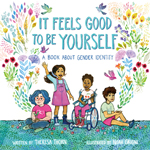 This picture books introduces four children: Ruthie, a transgender girl; Xavier, Ruthie’s cisgender brother; and Ruthie’s friends Alex and JJ, who both identify as nonbinary (Alex identifies as “both a boy and a girl” while JJ identifies as “neither a boy nor a girl”). Theresa Thorn and Noah Grigni explore gender identity with easy-to-understand language and colorful, expressive mixed-media illustrations. “There are a never-ending number of ways to be yourself in the world. Whether you feel like a boy, a girl, both, or neither, or if you describe yourself another way that is your gender identity.” Back matter includes a glossary, a note about pronouns and how they relate to gender identities, resources (books for kids, books for adults, a documentary film, and a list of organizations and helplines), an author’s note, and an illustrator’s note.
This picture books introduces four children: Ruthie, a transgender girl; Xavier, Ruthie’s cisgender brother; and Ruthie’s friends Alex and JJ, who both identify as nonbinary (Alex identifies as “both a boy and a girl” while JJ identifies as “neither a boy nor a girl”). Theresa Thorn and Noah Grigni explore gender identity with easy-to-understand language and colorful, expressive mixed-media illustrations. “There are a never-ending number of ways to be yourself in the world. Whether you feel like a boy, a girl, both, or neither, or if you describe yourself another way that is your gender identity.” Back matter includes a glossary, a note about pronouns and how they relate to gender identities, resources (books for kids, books for adults, a documentary film, and a list of organizations and helplines), an author’s note, and an illustrator’s note.
—CA
Stonewall: A Building. An Uprising. A Revolution. Rob Sanders. Ill. Jamey Christoph. 2019. Random House.
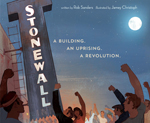 The Stonewall Inn itself narrates this picture book about its history. The building was erected in the 1840s as two side-by-side stable houses in Greenwich Village, and after a number of transformations, became the Stonewall Inn, a bar and dance club for the gay community in the 1960s. The Stonewall Inn witnessed frequent raids by the New York City police, and in the early hours of June 28, 1969, those not arrested during a raid didn’t just quietly disappear into the darkness as was usual; they defiantly stood in the street. “Immediately the spark of anger grew into a smoldering resistance….The Stonewall Uprising had begun.” Back matter includes a history of the Stonewall Inn; an album of captioned photographs; an interview with Martin Boyce, a participant in the Stonewall Uprising and LGBTQ+ activist; a glossary; and a list of books and websites for further reading.
The Stonewall Inn itself narrates this picture book about its history. The building was erected in the 1840s as two side-by-side stable houses in Greenwich Village, and after a number of transformations, became the Stonewall Inn, a bar and dance club for the gay community in the 1960s. The Stonewall Inn witnessed frequent raids by the New York City police, and in the early hours of June 28, 1969, those not arrested during a raid didn’t just quietly disappear into the darkness as was usual; they defiantly stood in the street. “Immediately the spark of anger grew into a smoldering resistance….The Stonewall Uprising had begun.” Back matter includes a history of the Stonewall Inn; an album of captioned photographs; an interview with Martin Boyce, a participant in the Stonewall Uprising and LGBTQ+ activist; a glossary; and a list of books and websites for further reading.
—CA
When Aidan Became a Brother. Kyle Lukoff. Ill. Kaylani Juanita. 2019. Lee & Low.
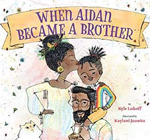 When Aidan was born, everyone thought he was a girl. His parents gave him a girl’s name, pretty dresses, and a room complete with a frilly, pink princess bed. As he got bigger, Aidan disliked his birth name and felt like his room belonged to someone else. Aidan knew he was really “another kind of boy.” He tells his parents what he knows about himself, and he and his parents join a supportive group of families with transgender kids. When his mother tells him she is having a baby, Aidan wants to make sure that this baby will feel understood right away. He helps his parents prepare for the baby’s arrival and knows that loving the baby is the most important part of being a big brother. The author’s note for this heartwarming and joyful story reminds young readers that “Aidan is a transgender kid, but he’s also just a kid. Like you.”
When Aidan was born, everyone thought he was a girl. His parents gave him a girl’s name, pretty dresses, and a room complete with a frilly, pink princess bed. As he got bigger, Aidan disliked his birth name and felt like his room belonged to someone else. Aidan knew he was really “another kind of boy.” He tells his parents what he knows about himself, and he and his parents join a supportive group of families with transgender kids. When his mother tells him she is having a baby, Aidan wants to make sure that this baby will feel understood right away. He helps his parents prepare for the baby’s arrival and knows that loving the baby is the most important part of being a big brother. The author’s note for this heartwarming and joyful story reminds young readers that “Aidan is a transgender kid, but he’s also just a kid. Like you.”
—CA
Ages 9–11
Meg, Jo, Beth, and Amy: A Graphic Novel. Ray Terciero. Ill. Bre Indigo. 2019. Little, Brown.
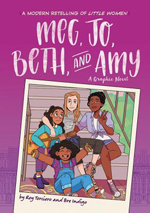 In this modern adaptation of Louisa May Alcott’s Little Women, the four March sisters are part of a blended family living in modern-day Brooklyn. Meg and her father are African American, Jo and her mother are white, and Beth and Amy are biracial. The four March girls have distinct personalities and interests. The eldest, Meg, works as a nanny, loves fashion, and dreams of marrying a rich man; Jo, who is gay, wants to be a writer and works as a personal assistant for Aunt Cath; Beth is shy, loves singing and playing the guitar, and has leukemia; and the youngest, Amy, who is bullied at school, is feisty and artistic. How the sisters support each other while dealing with personal and family problems is revealed through full-color digital graphic panels with realistic dialogue, journal entries, and emails to their father, who is serving in the military in the Middle East. This contemporary retelling of Alcott’s classic will appeal to middle-grade readers.
In this modern adaptation of Louisa May Alcott’s Little Women, the four March sisters are part of a blended family living in modern-day Brooklyn. Meg and her father are African American, Jo and her mother are white, and Beth and Amy are biracial. The four March girls have distinct personalities and interests. The eldest, Meg, works as a nanny, loves fashion, and dreams of marrying a rich man; Jo, who is gay, wants to be a writer and works as a personal assistant for Aunt Cath; Beth is shy, loves singing and playing the guitar, and has leukemia; and the youngest, Amy, who is bullied at school, is feisty and artistic. How the sisters support each other while dealing with personal and family problems is revealed through full-color digital graphic panels with realistic dialogue, journal entries, and emails to their father, who is serving in the military in the Middle East. This contemporary retelling of Alcott’s classic will appeal to middle-grade readers.
—CA
To Night Owl From Dogfish. Holly Goldberg Sloan & Meg Wolitzer. 2019. Dial/Penguin.
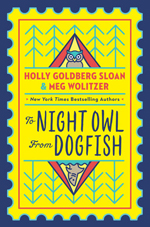 In this novel told entirely in emails and letters, California surfer girl Bett and New York bookworm Avery discover that their dads have fallen in love. Having no interest in becoming part of a blended family, or even worse, becoming friends, the two girls start emailing, assuring each other that they’ll never become friends, but all the while getting to know each other online. To make matters worse, they’re both sent to a summer camp where their dads hope they will become good friends—and take to the idea of becoming sisters. The girls’ summer camp experience turns into an adventure that they never expected, and Night Owl and Dogfish (nicknames they give themselves) end up bonding in surprising and delightful ways.
In this novel told entirely in emails and letters, California surfer girl Bett and New York bookworm Avery discover that their dads have fallen in love. Having no interest in becoming part of a blended family, or even worse, becoming friends, the two girls start emailing, assuring each other that they’ll never become friends, but all the while getting to know each other online. To make matters worse, they’re both sent to a summer camp where their dads hope they will become good friends—and take to the idea of becoming sisters. The girls’ summer camp experience turns into an adventure that they never expected, and Night Owl and Dogfish (nicknames they give themselves) end up bonding in surprising and delightful ways.
—SK
The Whispers. Greg Howard. 2019. Putnam/Penguin.
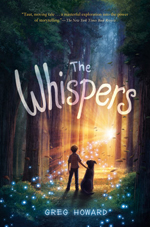 Eleven-year-old Riley’s mother has been missing, and no one in his family wants to talk about it. Riley refers to his “condition” of wetting the bed, he also fears that his other “condition”—his interest in boys, especially one boy—may have been the reason for his mother’s disappearance. Remembering his mother’s tale about the Whispers, magical woodland creatures who will grant your heart’s desire if you leave them tributes, he ventures into the woods to hear them whispering that his mother is there. As Riley explores his identity as a gay preteen, readers discover what happened to his mother. Childhood traumatic grief is portrayed along with themes of sexual identity, family, friendship, and loss.
Eleven-year-old Riley’s mother has been missing, and no one in his family wants to talk about it. Riley refers to his “condition” of wetting the bed, he also fears that his other “condition”—his interest in boys, especially one boy—may have been the reason for his mother’s disappearance. Remembering his mother’s tale about the Whispers, magical woodland creatures who will grant your heart’s desire if you leave them tributes, he ventures into the woods to hear them whispering that his mother is there. As Riley explores his identity as a gay preteen, readers discover what happened to his mother. Childhood traumatic grief is portrayed along with themes of sexual identity, family, friendship, and loss.
—SK
Ages 12–14
The Stonewall Riots: Coming Out in the Streets. Gayle E. Pitman. 2019. Abrams.
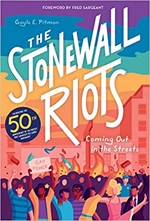 Gayle E. Pitman presents the history of the gay movement in the United States from the late 1800s to the Stonewall Riots in 1968 and their aftermath. Organized into five sections (Before the Riots, the Riots, Aftermath, Liberation, and Epilogue), brief chapter feature objects of historical importance in telling the story. Object #1 is the Jefferson Livery Stables, adjacent buildings constructed in 1843 and 1846, which eventually became the Stonewall Inn located at 52 and 53 Christopher Street in Greenwich Village. The final chapter with Object #50, The Stonewall Inn Today, ends with a powerful statement, “The Stonewall Inn is where the gay community found its voice, seized its power, and took action. It’s the birthplace of the modern LBGTQ+ movement—and once an entire community comes out of the closet, there’s no turning back.” Back matter includes a timeline; notes about each of the objects; an extensive bibliography of primary sources, books, articles, papers, websites, and broadcast; and an index.
Gayle E. Pitman presents the history of the gay movement in the United States from the late 1800s to the Stonewall Riots in 1968 and their aftermath. Organized into five sections (Before the Riots, the Riots, Aftermath, Liberation, and Epilogue), brief chapter feature objects of historical importance in telling the story. Object #1 is the Jefferson Livery Stables, adjacent buildings constructed in 1843 and 1846, which eventually became the Stonewall Inn located at 52 and 53 Christopher Street in Greenwich Village. The final chapter with Object #50, The Stonewall Inn Today, ends with a powerful statement, “The Stonewall Inn is where the gay community found its voice, seized its power, and took action. It’s the birthplace of the modern LBGTQ+ movement—and once an entire community comes out of the closet, there’s no turning back.” Back matter includes a timeline; notes about each of the objects; an extensive bibliography of primary sources, books, articles, papers, websites, and broadcast; and an index.
—CA
Ages 15+
I Wish You All the Best. Mason Deaver. 2019. Push/Scholastic.
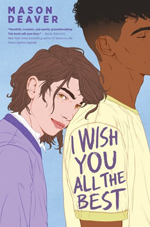 When 18-year-old nonbinary Ben De Backer comes out to their parents, they are promptly kicked out of the house. They find a home with their sister, Hannah, who they haven’t seen in 10 years, and her husband. Ben navigates their way through anxiety, loneliness, and rejection as they finish their senior year in a new school with new friends, a supportive art teacher, and a special friend named Nathan. As their friendship with Nathan turnsinto something more serious, Ben begins to realize a happier life is in their future and they have the opportunity to help other teenagers understand their own sexuality and find happiness.
When 18-year-old nonbinary Ben De Backer comes out to their parents, they are promptly kicked out of the house. They find a home with their sister, Hannah, who they haven’t seen in 10 years, and her husband. Ben navigates their way through anxiety, loneliness, and rejection as they finish their senior year in a new school with new friends, a supportive art teacher, and a special friend named Nathan. As their friendship with Nathan turnsinto something more serious, Ben begins to realize a happier life is in their future and they have the opportunity to help other teenagers understand their own sexuality and find happiness.
—SK
The Past and Other Things That Should Stay Buried. Shaun David Hutchinson. 2019. Simon Pulse/Simon & Schuster.
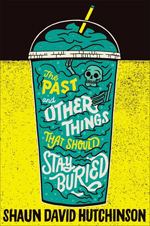 When Dino’s ex-best friend, a girl named July, dies suddenly, he has conflicting feelings toward his boyfriend, Rafi, who seemingly came between him and July. Dino makes his way to the funeral home that his parents own and finds July there, but not as he is used to seeing the dead. She is partly alive and partly dead, like a zombie. Dino and July try to understand what is happening with her while also figuring out how their friendship ended. Rafi patiently waits for Dino to come to terms with July’s death, which brings them even closer. This weirdly funny “zombie-esque” novel entertains and enlightens readers while dealing with topics of friendship, grief, and love.
When Dino’s ex-best friend, a girl named July, dies suddenly, he has conflicting feelings toward his boyfriend, Rafi, who seemingly came between him and July. Dino makes his way to the funeral home that his parents own and finds July there, but not as he is used to seeing the dead. She is partly alive and partly dead, like a zombie. Dino and July try to understand what is happening with her while also figuring out how their friendship ended. Rafi patiently waits for Dino to come to terms with July’s death, which brings them even closer. This weirdly funny “zombie-esque” novel entertains and enlightens readers while dealing with topics of friendship, grief, and love.
—SK
The Weight of the Stars. K. Ancrum. 2019. Imprint/Macmillan.
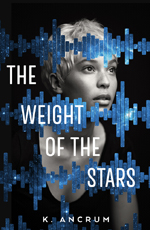 Ryann Bird, who has been living in a trailer park with her brother and nephew since her parents were killed in an accident, attends an affluent high school. When she is asked by her teacher to befriend new girl Alexandria, Ryann hides behind her “tough girl” exterior, and their relationship gets off to a rocky start. As Ryann and her friends learn more about Alexandria’s attempts to communicate with her mother, who volunteered for a one-way trip into space sponsored by a private company named SCOUT, they try to infiltrate SCOUT to find undelivered messages that Alexandria’s mother sent through the years. Ryann and Alexandria become close and discover that their feelings for each other run deeper than just friendship.
Ryann Bird, who has been living in a trailer park with her brother and nephew since her parents were killed in an accident, attends an affluent high school. When she is asked by her teacher to befriend new girl Alexandria, Ryann hides behind her “tough girl” exterior, and their relationship gets off to a rocky start. As Ryann and her friends learn more about Alexandria’s attempts to communicate with her mother, who volunteered for a one-way trip into space sponsored by a private company named SCOUT, they try to infiltrate SCOUT to find undelivered messages that Alexandria’s mother sent through the years. Ryann and Alexandria become close and discover that their feelings for each other run deeper than just friendship.
—SK
Susan Knell is a professor in the department of Teaching and Leadership at Pittsburg State University in Pittsburg, Kansas, where she teaches literacy and literature courses at the undergraduate and graduate level. Carolyn Angus is former director of the George G. Stone Center for Children's Books, Claremont Graduate University, in Claremont, California.